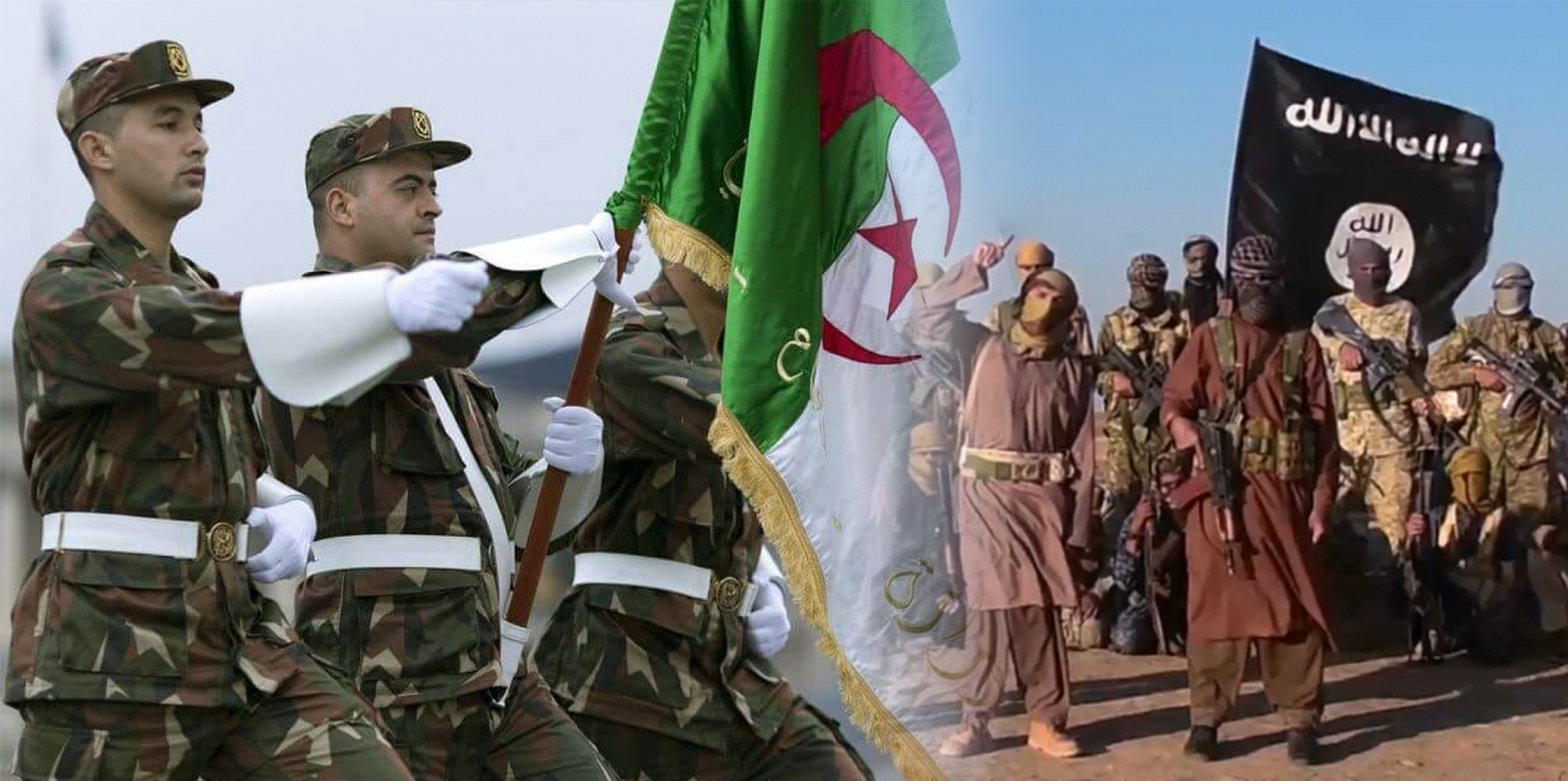Unstable conditions in Algeria’s neighboring countries have come to represent a major security challenge, which has been reflected in increased military operations to tighten border control and prevent the infiltration of terrorist elements. This state of alert is expected to continue during the coming period, to prevent any rebounds from the wave of terrorism in Africa, in addition to confronting any potential domestic threats after the MAK and Rashad movements’ classification as terrorist organizations.
Within this context, the Algerian army announced in late January a clash with terrorist elements in the province of “In Guezzam” south of the country, near the borders with Niger. The confrontations resulted in the killing of two soldiers and two terrorists, according to the Algerian Ministry of Defense. Algerian forces confiscated a 12.7mm heavy machine gun, two Kalashnikovs, a four-wheel drive vehicle, and ammunition of various calibers, reflecting continued attempts to confront any security threats.
The Algerian Ministry of Defense statement did not provide detailed information about the clashes, which took place on January 27th; it was unclear whether the clashes were the result of routine “combing” operations, or an attack on some military patrols. It appears likely that the clashes came as part of the army’s sweep of the area in pursuit of terrorist elements.
The province of “In Guezzam”, in which the clashes occurred is located in the far south of the country, on the border with Niger, is a desert region which had long suffered from neglect. Algeria’s president, Abdelmadjid Tebboune, declared the region a province in 2021, announcing a focus on development projects.
Due to its proximity to the border with Niger and its desert nature, this region represents a gateway for terrorists or illegal immigrants to infiltrate across the border and hide in the desert. However, there have not been operations against the army or its facilities, indicating that the size of the threat is controllable. Military and security operations to pursue terrorist elements have recently taken place in several locations in Algeria. In December 2021, the Algerian army carried out military operations to combat terrorism and fight organized crime in a number of areas. These continued in January 2022, with the Algerian army announcing the arrest of 26 persons accused of lending support to terrorist groups in separate operations. Moreover, the army discovered and destroyed 13 terrorist hideouts, and seized 3 homemade bombs in the governorates of Ain Defla and Bouira, located in the center of the country.
It is worth noting that in May 2021, Algeria added two entities to its terrorist list: the Rashad Movement, which was founded in 2007 and includes members who previously belonged to the Islamic Salvation Front, and the MAK movement, which was founded in 2001 in France seeking secession. Since then, security services and the army have pursued the two movements, and Algerian authorities have announced the dismantling of a number of their cells, and the arrest of several of their affiliates.
Cross-border threats
The security situation in several of Algeria’s neighboring countries is characterized by instability against a backdrop of rising terrorist operations and the spread of rebel groups. Algeria shares a border with Mali, which is witnessing increasing operations by Jama’at Nasr al-Islam wal Muslimin (JNIM), as part the Islamic Magreb’s Al Qaeda branch’s influence, as well as ISIS. Algeria also shares a border with Niger, in which ISIS is active within the so-called West Africa Province. This is in addition to the prominent Algerian component in the Al Qaeda branch in the Islamic Maghreb, which is led by an Algerian, Yazid Mubarak, known as Abu Obeida al-Annabi. There are also threats related to ISIS activity in Libya, which, while limited, pose further security challenges to Algeria.
The situation is exacerbated by the possible French withdrawal from Mali. Algeria has escalated its anti-terrorist military operations in view of the escalating differences between France and Mali regarding the role of French forces in combatting terrorism, whereby France reduced its forces. French Minister of Defense, Florence Parly, has declared that her country “cannot stay in Mali at any cost,” in light of the thorny relations with the Transitional Council, and Mali’s decision to contract the Russian Wagner group to support its operations against terrorist organizations.
Algeria has also started to increase coordination with Mauritania at the security level, with regard to controlling the borders between the two countries in 2021. The two sides signed a memorandum of understanding to establish a joint bilateral border committee in April 2021 during the Algerian Interior Minister’s visit to the Mauritanian capital, Nouakchott. The committee’s mandate is related to security issues to control the borders, and other economic issues to activate trade exchange. It began operating in November 2021, after which Mauritanian President Mohamed Ould Cheikh El-Ghazwani visited Algeria in December 2021. The visit saw the two sides sign several cooperation agreements covering a number of fields.
Security challenges
The recent clash on the southern border with Niger comes within a broader framework, related to the intensification of army and police efforts to pursue elements affiliated with not only regional, but also domestic, terrorist movements and groups. Some of these domestic groups were previously classified as opposition or secessionist movements, such as the Rashad and MAK movements, which have recently been added to the list of terrorist organizations. This raises the possibility that some members of the two movements may resort to violence. The military and security operations reflect a desire to confront any potential domestic threats, in addition to the possibility of jihadist organizations recruiting elements from within to carry out terrorist operations.
The recent clashes also highlight the threats Algeria may face on the border with Niger, given the nature of the region, which provides a suitable environment for the movement of terrorists and organized crime gangs involved in drug and human trafficking to and from Algeria. Algeria is therefore increasing its efforts to monitor the border with Niger.
It is worth noting the statements of the Algerian Army Chief of Staff Lieutenant General Said Chanegriha in April 2021 during a speech at one of the military headquarters in Tamanrasset, on the border with Mali, in which he warned of plans by terrorist groups operating in the African Sahel region to turn the Algerian desert into a safe haven. Algeria’s military operations and the state of alert must therefore be viewed within a wider framework, seeking to prevent the wave of violence in the Sahel region as a whole from spreading to Algeria.
Algeria may therefore seek to elevate its anti-terrorism efforts to a higher level of regional cooperation in the near future. It’s motivation in doing so will not only be related to increasing its security, but also to countering the rising Moroccan influence in its geographical surroundings, which also relies on anti-terrorism activity. Algeria’s coordination Mauritania on border control is of note here, and the agreements reached during Mauritania’s president’s visit to Algeria in December 2021, as well as the Algerian Foreign Minister’s visit to Niger, Mali, and Mauritania in September 2021, signaling Algerian moves to increase involvement.


